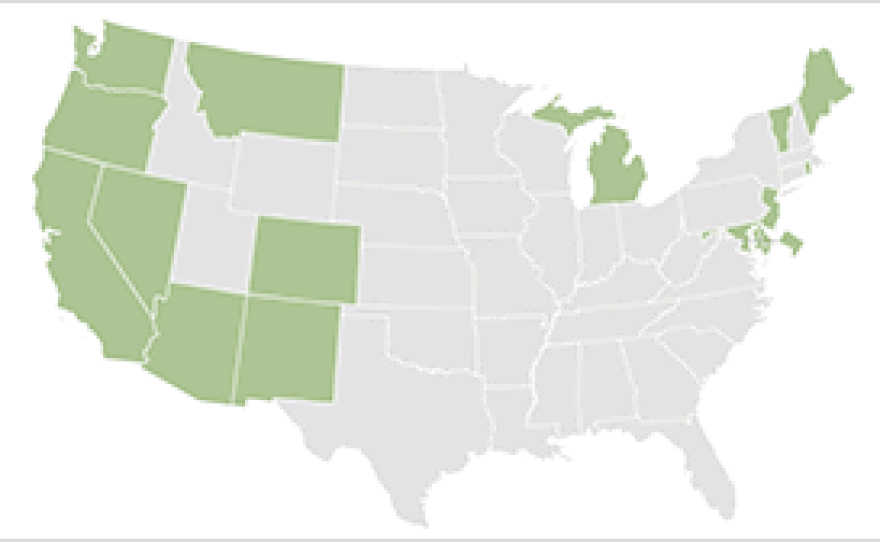Marijuana advocates have been arguing for years that pot is not only harmless but has beneficial qualities. Such claims are having an effect.
Fewer than half of Americans think marijuana should be legalized -- but just barely half. The most recent Gallup and CBS News polls on this topic both show that 44 percent favor legalization. Compare that with roughly 25 percent in favor from the late 1970s into the mid-1990s.
The change in attitude toward pot shows up not only in polls, but in use. A survey released Thursday by the Substance Abuse and Mental Health Service Administration showed that use of illegal drugs rose last year to the highest levels in nearly a decade. Marijuana use was most prevalent, but ecstasy and methamphetamine posted gains, too.
Drug policy experts say this reflects changes in the perceived risks of taking drugs -- both of being caught and of suffering societal disapproval. A California initiative to legalize marijuana this November would amplify this effect if it passes.
"There is such a push on the part of the marijuana lobby to soften up the public," says Eric Voth, a physician who chairs the Institute on Global Drug Policy, an anti-drug alliance of physicians, scientists and attorneys. "The perception of harm has dropped. You saw this increase in pot first and now you're seeing this increase in ecstasy and meth."
Taking It To The States
Fourteen states and the District of Columbia allow people to use marijuana for medical purposes, such as improving the appetite of cancer and AIDS patients.
"What people are responding to is the realization that the government has been lying for decades and that marijuana is less harmful than legal drugs like alcohol and tobacco," says Mike Meno, communications director for the Marijuana Policy Project, which favors legalization.

Medical marijuana has become big business. Americans are spending $25 billion a year on marijuana, according to Harvard University economist Jeffrey Miron. The number of patients and licensed dispensers has doubled over the past year in Rhode Island alone. In July, the Oakland City Council approved construction of four industrial-sized marijuana factories.
Last month, the Boulder County SWAT team destroyed 7,500 marijuana plants -- about five football fields' worth. But medical marijuana remains a growth industry in Colorado. Next week, doctors, dispensers and marketing experts will gather at a downtown Denver hotel for the Plant Medicine Expo & Healthcare Provider Conference.
"It's way beyond legalizing," Voth says. "The medical excuse opened the door."
What Goes Down Must Come Up
Voth and other drug war veterans say they've seen this all before. During the 1970s, about a dozen states decriminalized marijuana. Eventually, the era's spike in drug use -- particularly cocaine -- prompted harsher laws under the Reagan administration and a parents' movement that forced a crackdown.
Use of marijuana and other illegal drugs reached their peak in the late 1970s. In 1979, 1 out of every 3 high school seniors was smoking dope on a regular basis, according to Herbert Kleber, a Columbia University psychiatrist who served as deputy drug "czar" under President George H.W. Bush.
That number dropped markedly during the early 1990s. With people witnessing fewer ill effects due to diminished drug use, it started to seem safe again to indulge. Drug use is still nowhere near the levels of the 1970s, but the latest figures mark a reversal nonetheless.
"It's not so much that the rise is so great as that it contrasts with the long period of decline," says Lloyd Johnston, a social psychologist at the University of Michigan. "Clearly that decade of improvement has come to a halt."
Changes In Attitude
Those who oppose recreational use of marijuana blame the well-organized and funded campaign to normalize it. "Attitudes for all kinds of reasons have been softening about the risks and dangers of marijuana," says John Carnevale, an economist and drug policy consultant who has worked on the issue during both Republican and Democratic administrations, including those of presidents Clinton and Reagan.
Drugs that enjoy a patina of medical approval -- whether marijuana or prescription drugs such as OxyContin, which has seen enormous growth in recreational use -- seem safe, or at least safer than street drugs. If doctors prescribe them, how bad can they be?
"The idea that smoking is medicine is an indicator in the minds of young users that this is not harmful," Carnevale says.
Looking To California
California voters, who approved a pioneering medical marijuana initiative in 1996, will soon decide whether to legalize marijuana altogether. November's Proposition 19 has not yet attracted the same number of wealthy out-of-state backers, such as financier George Soros, as the earlier initiative.
But it has garnered support from a number of state and local officials, eager for the billions in tax revenues that legalized pot promises to generate. On Monday, the Service Employees International Union's California State Council -- one of the biggest public employee unions in the state -- endorsed Proposition 19.
Polls indicate the proposition has roughly a 50-50 chance of passing. Both marijuana advocates and opponents agree that passage would have an enormous impact, with other states likely to follow suit and the drug becoming more readily available to young people.
"If California were to pass Proposition 19, it would be revolutionary," says Meno, the Marijuana Policy Project spokesman. "People would see that the sky doesn't fall, the police will have more resources to fight crimes and there will be more revenues for local budgets."
Future Growth -- Or Backlash
It's not clear how the Obama administration, which announced last year that it would end the Bush administration policy of routinely raiding medical marijuana dispensaries, would react to outright legalization in one state. Every former chief of the Drug Enforcement Administration has called on Attorney General Eric Holder to oppose the initiative.
"I don't expect [to see] us returning to a drug war hysteria under an Obama administration," says Miron, the Harvard economist. But, he adds, "If Proposition 19 passes, some Republicans will get energized and demand that there's a federal response. The Obama administration will be in a pickle if that happens. They don't want to be fighting over that issue, but they don't want to be seen as too much in the pro-drug camp."
Robert L. DuPont, president of the Institute for Behavior and Health, says that regardless of the outcome in California, marijuana advocates have "already won" by shifting the terms of debate and increasing acceptance of drug use. He predicts that illegal drug use will continue to rise.
But DuPont, who served as a top drug policy official under Presidents Nixon, Ford and Carter, also predicts that increasing use will, in time, bring tolerance to an end. "I'm confident these folks have created the reaction that will stop them," he says. "The data's going to get worse in coming years and that's going to re-create the bipartisan opposition to illegal drug use that we saw between 1979 and 1991."
Copyright 2022 NPR. To see more, visit https://www.npr.org. 9(MDAzMjM2NDYzMDEyMzc1Njk5NjAxNzY3OQ001))






